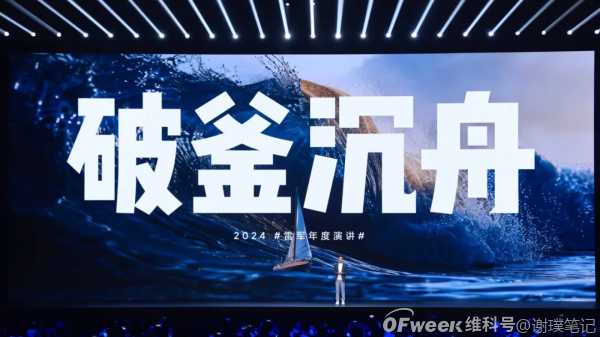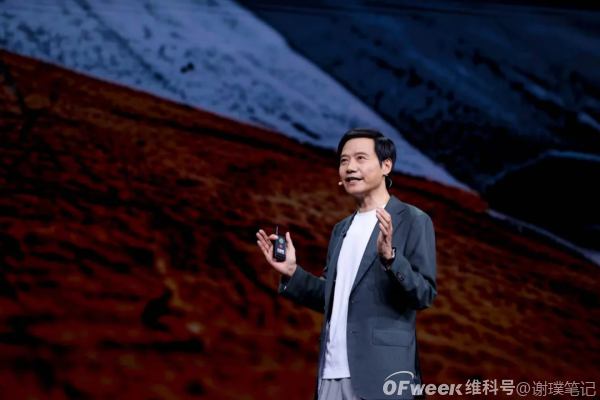Lei Jun's Counterintuitive Success and Riding the Wave
![]() 07/26 2024
07/26 2024
![]() 654
654
Before Lei Jun's annual speech, his friend Li Xiang posed a question: Is Lei Jun's move into car manufacturing riding the wave or swimming against the tide? An insightful summary in the comment section reads, "Riding the Wave to Overcome the Odds."
The gist is that Xiaomi's transition from smartphones to IoT and then into automobiles, driven by industry trends, was a strategic necessity. However, the timing of Xiaomi's entry was unfavorable – initially seen as the "late bus," it turned out to be the "final bus."

Upon closely listening to Lei Jun's "Courage" speech, however, the analytical framework of "Riding the Wave to Overcome the Odds" contrasts sharply with Lei Jun's personal summation: While Xiaomi's entry into the automotive industry is indeed an inevitable outcome of industrial evolution, the decision was prompted by a chance event – the US ban on Xiaomi – which was eventually lifted through Xiaomi's appeals. As for the timing, Lei Jun argues, "The automotive industry is a century-long race. If you genuinely want to do it, any time you start is the best time."
Xiaomi's entry into the smartphone market was a "first bus," riding the wave. Yet, its foray into automobiles is a "final bus," requiring a breakthrough against the tide.
When Xiaomi ventured into mobile phones, Lei Jun felt a sense of urgency. Xiaomi was like a bull rushing into a porcelain shop, a disruptor with a "live or die, just do it" mentality, swift and fierce.
Building cars represents Xiaomi's second and Lei Jun's last entrepreneurial venture. Although Lei Jun says he's staking his entire reputation and achievements on it, the challenges are immense. Yet, the progress of Xiaomi Automobile suggests a measured pace, with Lei Jun appearing calm and even enjoying the journey.

Lei Jun was in his prime when Xiaomi started, and he was entering his fifties when he announced the car project. Over the years, his mindset has evolved. When making smartphones, Lei Jun sought to prove himself, with a burning desire to light up the world. With cars, however, he carries a stronger sense of responsibility and mission.
From self-discovery to embracing the universe, one realizes the grandeur of the cosmos yet cherishes the green of grass.
A friend of mine observes that the market sentiment has shifted from smartphones to automobiles. Lei Jun was once renowned for Xiaomi phones but also faced criticism. Now, while there's still controversy surrounding Xiaomi Automobile, the overall sentiment is one of hope for Lei Jun and Xiaomi Automobile's success. In this era of unprecedented change, Lei Jun stands out as a rare tech leader who remains active at the forefront, engaging with the public and enjoying their jokes.
Some jokingly call Lei Jun a "walking billboard." It's a fascinating fact that Lei Jun is almost always promoting Xiaomi, and the public has grown accustomed to it, even enjoying it. While commercial success is crucial, Lei Jun's attitude might be more essential: "Avoid being deified, strive for authenticity, and be willing to show vulnerability. The public loves uplifting stories, but sincerity and diligence are enough."
Constant exposure can lead to misconceptions, with many believing Lei Jun excels at marketing. Some competitors even push this narrative, placing him in an awkward position as the "God of Marketing." However, Lei Jun is first and foremost an engineer with a background in coding. His true strength lies in systems science and engineering. Ironically, those who started in marketing claim to "master core technologies," while Lei Jun, an engineer, is perceived as a marketing genius. Such misunderstandings don't hinder Lei Jun's sincerity and diligence, which are infectious, rooted in his experiences and personal cultivation. As a tech leader with traditional values, Lei Jun's "small-town youth" background makes him adept at connecting with the masses.
You might think Lei Jun is the protagonist of a feel-good novel, but it's actually more like "Even Wild Lilies Have Their Spring".
Lei Jun believes in the teachings of Wang Yangming, emphasizing sincerity and diligence—principles exemplified by "rectifying one's intentions," "unity of knowledge and action," and "learning through practice." Wang Yangming's philosophy serves as a key to understanding Lei Jun. Committed to building excellent cars, Lei Jun has shown tremendous determination, starting from scratch and focusing on fundamentals, engaging in meticulous and repeated efforts. For instance, he has interviewed over 300 engineers, observed what cars employees in the company's garage drive, started driving himself again, personally experienced what makes good cars good according to engineers, watched car racing movies, obtained a racing license, participated in winter and summer vehicle tests, and penned over 200,000 words of test drive notes.
This explains why Xiaomi's board insists that Lei Jun must personally lead the car manufacturing team. Without entering the automotive sector, Xiaomi might end up like once-glorious companies such as IBM, HP, Motorola, and Nokia, gradually becoming an ordinary company and fading into obscurity. While Xiaomi may still rank among the Global 500, it likely wouldn't be at the center stage. Having navigated the tides of changing times and business cycles for many years, Lei Jun understands this well—considering that Kingsoft, his previous company, has a history of 36 years. Beyond Kingsoft, Lei Jun has also founded Joyo.com and invested in companies like UC, Vancl, Li Auto, and XPeng Motors. Thus, Lei Jun reflects:
"No company can always remain at the center stage. Xiaomi aspires to be a technological leader. Flowers do not stay in bloom for a hundred days; the most important thing is to never stop making progress."
"Never stop making progress" is a true reflection of Lei Jun. Those familiar with him often remark on his exceptional learning ability. Lei Jun is always learning and always progressing. In a sense, the radius of Lei Jun's understanding is bound to be the radius of Xiaomi's growth.
The setbacks experienced by Xiaomi's smartphone division have ultimately become valuable lessons for Xiaomi's automotive venture.
When Xiaomi started its journey by making smartphones, it was riding the wave of the mobile internet era, moving rapidly with the tide. Essentially, Xiaomi's smartphone business was an "innovation in business model," akin to Ford's Model T. At that time, Lei Jun honed his skills in strategic maneuvering, employing techniques similar to the "Great Shift of the Heavens and Earth" and the "Four Ounces Moving a Thousand Pounds" of Tai Chi. The initial innovation in Xiaomi's business model borrowed elements from companies like Kingsoft, Joyo.com, Vancl, and UC. However, with its second entrepreneurial venture into car manufacturing, Xiaomi is going against the current—its strategy is to stay true to core principles while introducing unique innovations. Xiaomi's approach to automotive innovation focuses on solid core technologies, avoiding shortcuts, with Lei Jun leading the team in rigorous and earnest efforts akin to practicing the "Tiger Subduing Arhat Fist."
In launching its smartphone business, Xiaomi leveraged smart strategies; in its second entrepreneurial venture into automobiles, it is relying on diligent hard work. According to the philosophy of Zeng Guofan, this is like building a fortified camp and fighting a straightforward battle. Zeng Guofan also believed in the philosophy of Wang Yangming.
From an external perspective, Xiaomi's announcement to enter the automotive industry might seem "late." However, from Lei Jun's mindset and Xiaomi's internal standpoint, the timing is just right. In 2014, Tesla announced the opening of its patents, which directly led to a surge in domestic new energy vehicle startups like XPeng, NIO, and Li Auto, founded around 2014-2015. At that time, Xiaomi's smartphone business was facing its first major challenge since its inception. Xiaomi decided to enter the automotive sector in 2021, after the company went public and its smartphones gradually established a foothold in the high-end market. From 2015, when its smartphone business encountered a bottleneck, to 2018, when it went public, and up to around 2021, when it stabilized in the high-end segment, Xiaomi had been continuously catching up, especially in technology R&D. With the lessons learned from the smartphone business, Xiaomi's automotive strategy and operations have undergone iterative upgrades. Hence, Xiaomi Auto started by focusing on core technologies, with tenfold investments, remaining true to its principles while introducing unique innovations, and moving forward with confidence.
If Xiaomi's smartphone business was about introducing unique innovations while staying true to core principles, then Xiaomi's automotive venture is about staying true to core principles while introducing unique innovations.
Success is the father of success, but it is also the mother of failure. Many large companies fail in their second entrepreneurial ventures because they easily fall into the trap of path dependence, cognitive misalignment, inertia, and the burden of their own legacy. From Xiaomi smartphones to Xiaomi cars, while Lei Jun certainly continues some traditional aspects, he is predominantly focused on overturning past practices. This transformation began from the very start and has been continuously emphasized—for instance, Xiaomi Auto plans to invest $10 billion without seeking independent funding, and Lei Jun personally leads the team, staking his lifetime reputation and achievements on this venture. This series of "burning bridges" strategies aims to create a scenario of "rebirth from destruction," akin to reaching the end of the watercourse and then calmly watching the clouds rise. According to Xiaomi's rhetoric, this is previously referred to as driving oneself crazy. In his speech, Lei Jun put it this way:
"The courage to burn your bridges is the key to breaking through."
In his annual speech, Lei Jun spoke about courage, the audience heard about striving, and what I saw was light.
To borrow Lei Jun's words, I wish everyone:
May you always possess the courage to overcome obstacles and the confidence to move forward!
Courage and confidence are incredibly valuable in the present moment.







